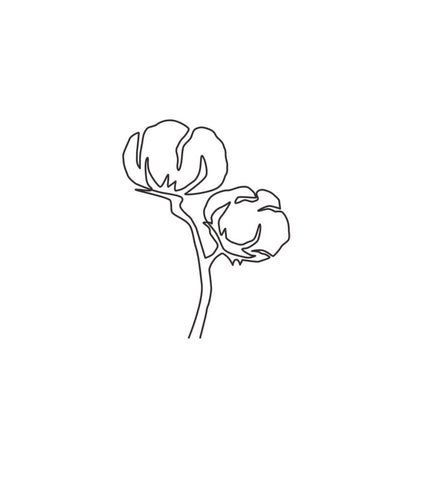Sustainable Fabrics

Organic Hemp
Hemp is the rock star plant of sustainable fabrication and we're very excited to give it the starring role on our stage.
A few of the reasons we love hemp so much -
+ One of the most versatile plants on the Planet - it can withstand, survive and thrive in most environmental conditions
+ It is incredibly fast growing (can reach full size in about 90 days!!), unlike cotton which takes around 6 + months
+ It can be made into just about anything (tees, paper, food, you name it!)
+ It helps to save the Plant. Industrial hemp crops have been shown to remove significantly more carbon dioxide from our atmosphere than an area of trees the same size (carbon sink). Annually hemp removes from the atmosphere roughly 11 tonnes per hectare of Carbon Dioxide
+ Hemp grows and thrives without pesticides, herbicides or fungicides. These chemicals have had a hugely damaging impact on our environment, waterways and human health.
+ Hemp nutrients regenerate and purify the soil giving long lasting crops
-
+ Hemp requires very little water to grow compared to other natural fibres such as cotton and linen

Organic Cotton
.
We will only use organic (or recycled) produce to make our goods - we know that the widespread use of carcinogenic chemicals to grow non-organic plants damages the Planet and causes serious illness – so using organic is a win-win for you and our Planet
.
Few reasons why we're taking the organic route
+ Better for you and your skin (no toxic chemicals in the garments)
+ No use of pesticides / herbicides / fungicides - therefore helping to improve the quality of the land, prevent water contamination, conserve biodiversity and protect our health
+ Water to feed the plants is most likely to be sourced from rainfall, as opposed to surface or groundwater irrigation.
+ Organic growers use a combination of traditional and modern scientific practices to grow crops in a way that develops healthy, fertile soil; conserves biodiversity and protects natural resources
+ Better for the health of organic farmers
+ Farmers generally receive a fairer wage

Recycled Fabrics
Every second, the equivalent of one rubbish truck of textiles is landfilled or burned. 1 truck per second. To landfill. Our landfills are overflowing with textile waste, a conservative estimate is that clothing and textiles make up 7% of landfills globally although many believe this figure is closer to 12%.
Landfills are the third largest source of methane (a chemical that when released is known to be 25 x more efficient than Carbon dioxide at trapping radiation, making it a huge global warming problem).
With over 100 billion items of clothing being produced every year and 85% of clothing ending up either in a landfill or incineration, there is a massive problem in constantly making new clothes from mostly unsustainable materials
Using recycled materials in clothing production has some massive benefits and solutions.
With over 100 billion items of clothing being produced every year and 85% of clothing ending up either in a landfill or incineration, there is a massive problem in constantly making new clothes from mostly unsustainable materials
Using recycled materials in clothing production has some massive benefits and solutions.
.
Few of the reasons we’re using recycled materials where possible
+ Drastically decreases the amount of clothing which ends up in landfills
+ Drastically decreases the amount of clothing which ends up in landfills
+ Recycling 1 million tons of clothing textiles is the equivalent of removing 500,000 cars from the road in terms of global warming contributions
+ By using them in garment production, it reduces the number of plastic bottles and other plastic waste that end up in the ocean and in landfills
+ Requires significantly less resources, energy and fossil fuels compared to producing new garments, avoiding Carbon Dioxide emissions and water usage
+ The more we recycle the more it will become the norm, and the more advanced recycling and processing technologies will become as demand increases
+ Keep the loop going so that clothing can continue to be reused and recycled
